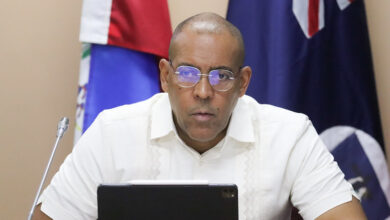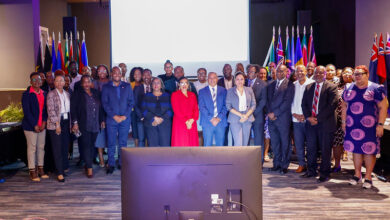I am very pleased to welcome you, to this long overdue Special Meeting of the Council for Trade and Economic Development (COTED) on Information and Communication Technologies.
At the outset I must acknowledge the instrumental role of the Prime Minister of Grenada, Dr the Rt. Honourable Keith Mitchell on whose initiative this critical Meeting is being held. It was the Prime Minister who insisted to his colleagues at last July’s Meeting of the Heads of Government that ICT should be an area of focus at their Inter-Sessional Meeting next month in St. Vincent and the Grenadines, the other being Human Resource Development. It is in preparation for the Heads of Government meeting that we are gathered here today, as the recommendations from this meeting will be key in setting the parameters for the discussions by our leaders.
Prime Minister, your initiative as Lead Head of Government is bearing fruit in this most important sector and enabler of our development. Your deliberations, Ministers, will be extremely important for the strategic direction of the future development and growth of ICT in the Caribbean Community. ICT combines information, knowledge, processes, and technology to provide a foundation for driving efficiencies and fuelling innovation. It is no surprise, therefore, that in the course of consultations during the past year with stakeholders across the Region for the Community’s Five Year Strategic Plan, ICT emerged as one of the major areas of focus identified to spur our growth and development.
ICT is playing an increasingly important role in the global economy. It has spawned a deeply connected and digitized society which has created a completely new economy – the digital economy – which speaks to economic value derived from the internet and other ICTs. We must therefore, not fail to include it as an important part of our regional economy since it is an enabler of growth through increasing our efficiency and productivity. It has to be a significant factor, as we forge a path towards a CARICOM Single Market and Economy (CSME). ICT must be viewed as the new frontier for regional integration.
Despite the much-reported benefits of ICT, its development and adoption by developing countries, such as ours, have so far been limited. Reasons for this include:
Lack of awareness of what ICT can offer.
Insufficient telecommunications infrastructure and Internet connectivity,
Expensive Internet access.
Absence of adequate legal and regulatory frameworks.
Shortage of requisite human capacity.
Failure to use local language and content,
and lack of entrepreneurship and a business culture open to change.
That reality has already been recognised by the Community as evidenced by the design of a Regional Digital Development Strategy with an accompanying Action Plan for implementation. The elements of that Strategy include: the development of a CARICOM Single ICT Space; Capacity-Building; Regional Policy Direction, Leadership and Governance; Innovation and Efficiency; all of which lead to a CARICOM Information and Knowledge Society.
The establishment of a Single ICT Space brings to the fore real benefits for consumers and businesses in our Community. The objective is to fully establish modern regional regulatory and open telecommunications infrastructures with affordable networks using converged technologies, to provide affordable and universal access. This would positively affect such issues as roaming rates, provide for a single area code as well as address copyright, spectrum and broadband matters.
Just as important as that single space is the development of a human resource capacity in the sector. This is fundamental as we seek to build a digital culture across the Community and increase the value and volume of the Region’s trained ICT workforce that can create, develop and use ICT to improve lifestyle and economic value. Promoting such initiatives would also foster innovation and increase our competitiveness, both of which are essential in achieving our goal of sustainable economic growth and development.
A step in that direction is the Caribbean Research and Education Network – C@ribNET which was launched last February and is operated and managed by the Caribbean Knowledge and Learning Network Agency (CKLNA). A successful digital economy hinges on our ability to harness Research, Innovation and Education, and C@ribNET, if utilised fully can facilitate advancement in these areas and other sectors such as health. Mechanisms must be put in place to take advantage at the national level of the possibilities offered via C@ribNET. Thus C@ribNET should be celebrated as a Regional ‘win’ and a public good.
In implementing the Regional Digital Development Strategy, there is a role for all the relevant regional institutions and the private sector. Some of these institutions such as the Caribbean Telecommunications Union (CTU), CARICAD, and CXC along with the regional universities are already engaged in initiatives which with proper co-ordination would greatly assist the achievement of the objectives of the strategy.
These are some of the strategic issues that engage us at this time and upon which this meeting must deliberate to guide our Heads of Government as they consider the way forward for this crucial sector in the social and economic growth and development of our Community and its people.
On that note, I extend my very best wishes for a successful, productive and fruitful Meeting.





